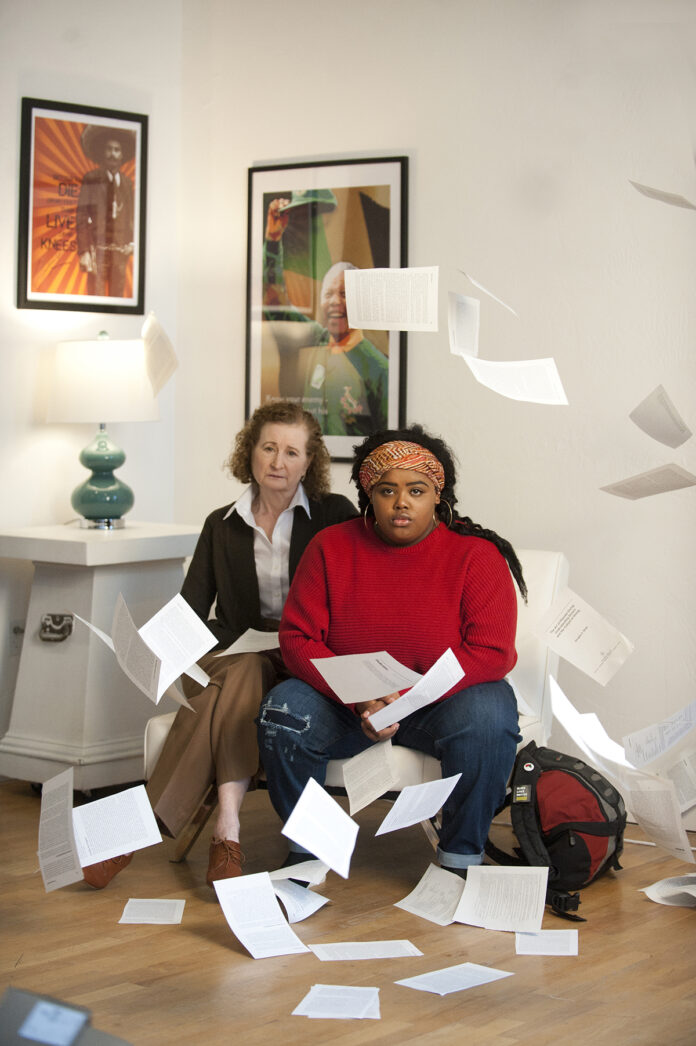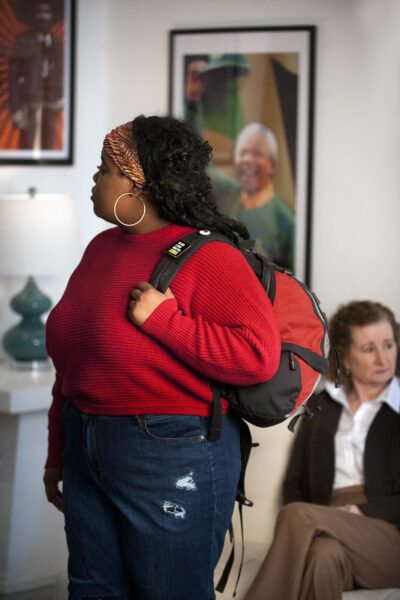
Company of Fools To Stage ‘The Niceties’
BY DANA DUGAN

We all have been, or known, that one student who asks too many questions, disrupts classes with arguments, and generally challenges professors. “The Niceties,” by Eleanor Burgess, brings us something akin to that sticky situation but in a way that raises the audience’s own level of awareness.
Directed by Company of Fools Producing Artistic Director Scott Palmer, the play will be presented at the Liberty Theatre in Hailey from Wednesday, Feb. 19, to Saturday, March 7.
“I can’t say enough about Burgess as a writer,” Palmer said. “It’s funny, too—a very real, cleverly constructed, remarkable piece of theater. It feels profoundly realistic. There’s a legitimacy of perspective.”
Janine Bosco, played by Claudia McCain, is an acclaimed history professor at an elite university in the last year of the Obama presidency. Zoe Reed, a brilliant young African American student, is played by Alexis Ulrich. During the course of the action, the women meet to discuss a paper Zoe is writing about the American Revolution.
The conversations have imbedded in them a myriad of issues: gender, class, age, race, revolution, American history and the academic process. It’s heady stuff that plays with the idea of history as written by the victors, while ignoring the story of the oppressed. This insightful play allows audiences to alternate between both sides in this fast-evolving debate.
“Zoe wants to get her final paper in early, which is something I would do,” said Ulrich, who is majoring in theatre at Idaho State University. She most recently appeared in COF’s production of “Miss Bennet: Christmas at Pemberley.”
“She’s close to me, I question things,” Ulrich said. “I also relate to her as being a student of color, and a junior in college, so it’s very familiar.”
“I show my black excellence to the world, and I hope, I hope, that the world sees it,” Zoe says in the play. The setup unspools with electricity.
“I’ve dealt with some of these issues and conversations my entire life,” Ulrich said. “I want to do work that inspires conversation. It’s powerful for me. That’s why I went into theatre.”
The ongoing heated conversation between these women envelops the play in language and perspective.
“It’s so important to listen to this play,” McCain said. “There is no grey area for both of them. They’re both so invested in their belief systems. They both have important things to say and they don’t listen to each other.
“I’ve had maybe three or four really challenging roles—this is among the top,” McClain said. “It is dense, layered and packed with so much. There’s been a lot of research, which is great for an actor. I’m indebted to Scott [Palmer] for entrusting me with this. He’s really brilliant.”

This COF season has been dedicated to the idea of family. So how does this play between two very smart but ideologically disparate women come into that idea?
“It’s the family that we choose,” Palmer said. “These two women should be on the same side but are so similar to each other. It can be frustrating to realize how close they are, and if they could just listen, they could be family. But they’re defensive. There’s a moment in the second act where they are close to understanding each other.”
Like life, we miss opportunities daily to be nicer to each other due to vanity, pride and a lack of empathy. The title is, in fact, scathing. Ultimately, there are no niceties.
“There’s an intersectionality about this,” Palmer said. “It’d be easy to say this is about race, but it’s not. It’s intergenerational. It’s gender, and different forms of feminism. So much of the time we know who the good guy and bad guy is. This is more complicated. The starting point is that conversation. What is a footnote, and what is appropriate? What is white supremacy, who gets to tell the history of America? Neither is right but neither is wrong, either.”


